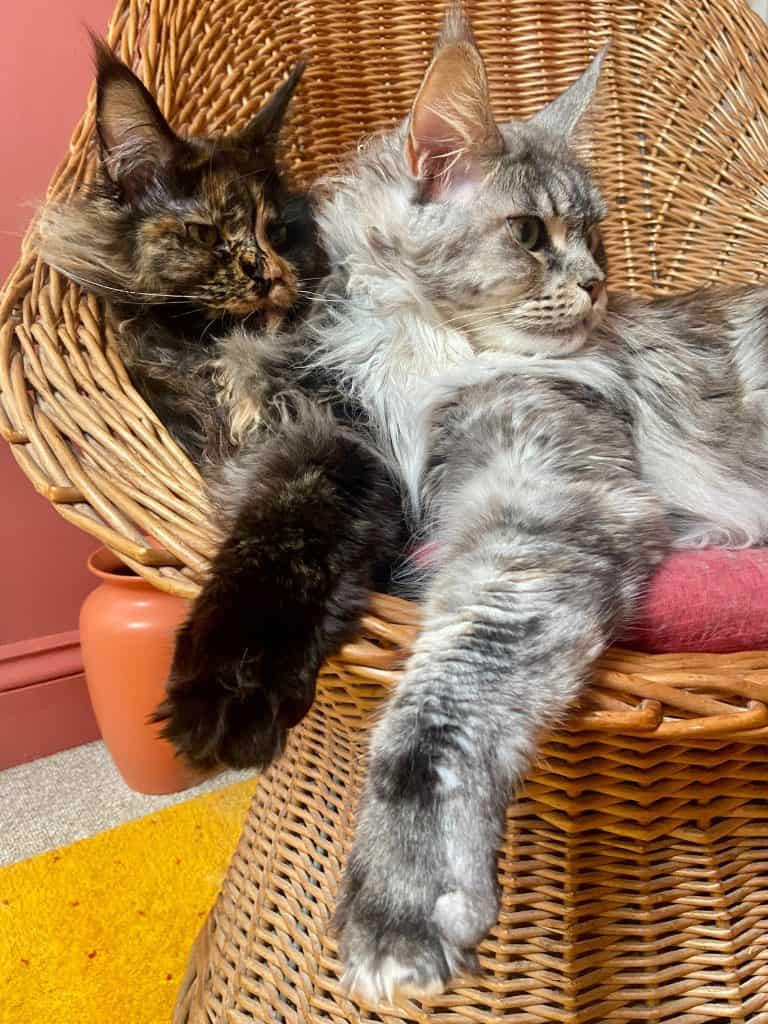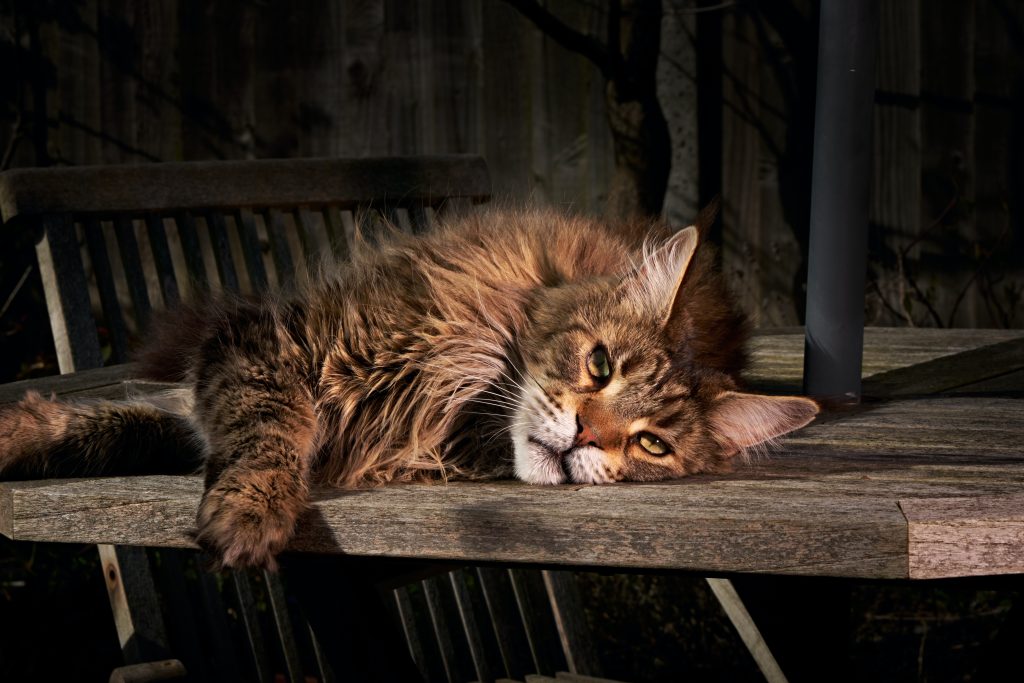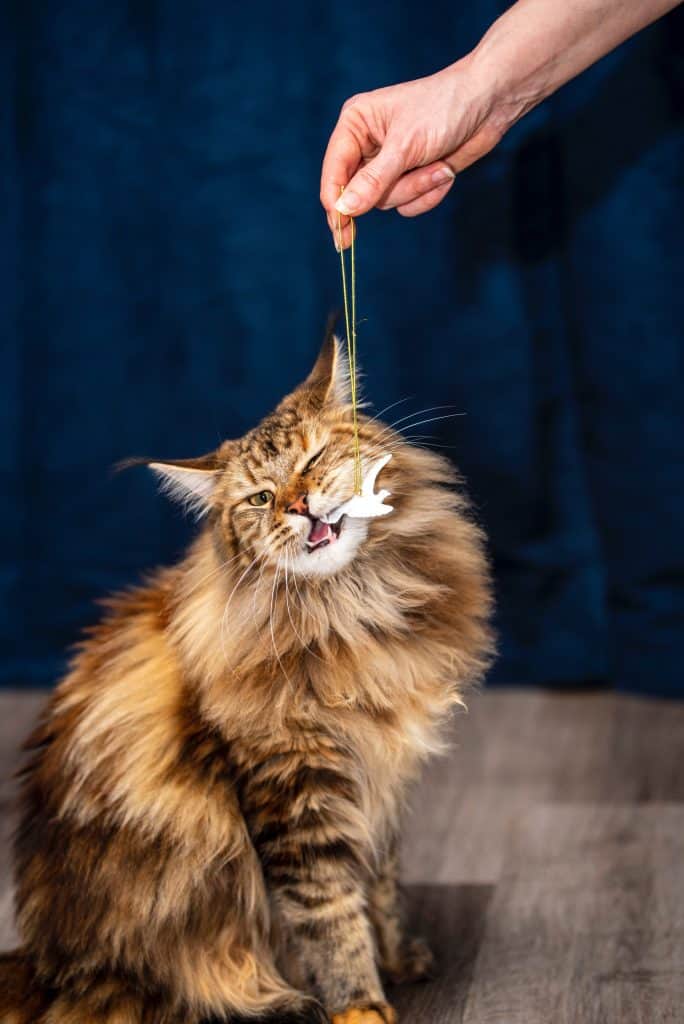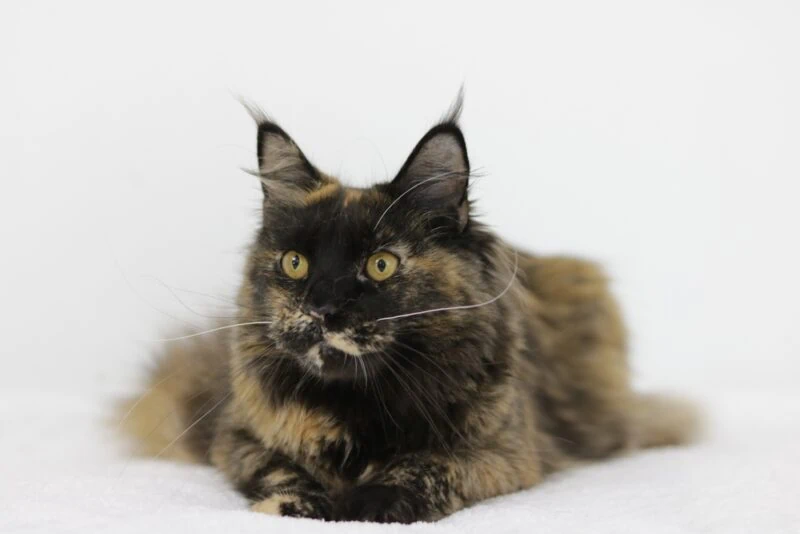Maine Coon cats are known for their majestic appearance and friendly personalities, but have you ever heard of a Maine Coon Tortie mix cat? These beautiful felines are a unique variation of the popular breed and have captured the hearts of cat lovers everywhere.
In this article, we will take a closer look at Maine Coon Tortie cats, their characteristics, history, temperament, and care requirements.
Table of Contents
What is a Maine Coon Tortie Mix?
The Maine Coon Tortie is not a separate hybrid. Instead, a Tortoiseshell Maine Coon cat is a Maine Coon with a distinct coat pattern that combines two or more colors. These cats have a mix of black, orange, and cream-colored fur, creating a unique tortoiseshell appearance. The colors are usually well-distributed across the cat’s body, and the pattern can vary in intensity and shape.
Maine Coon Torties are highly sought after by cat enthusiasts because of their striking appearance and the fact that they are relatively rare. The coloration results from a genetic mutation that causes the fur to develop in patches of different colors.

History of the Maine Coon Cat
The Maine Coon is a native American breed that originated in the state of Maine during the 19th century. Farmers and fishermen highly valued these cats for their ability to catch mice and other pests, as well as for their friendly and affectionate personalities.
There are many theories about the origins of the Maine Coon breed. Some believe the cats descended from domesticated cats brought over by European settlers. In contrast, others believe they result from breeding between domestic cats and wild lynxes or bobcats.
Regardless of their origins, the Maine Coon quickly became a beloved breed in America and was even recognized as an official breed by the Cat Fanciers’ Association in 1976.

Male and Female Maine Coon Torties
Male and female Maine Coon Tortie cats have some distinct differences that are important to note when considering which gender to adopt. While the differences are not necessarily specific to the Tortoiseshell coloration, they are still relevant for potential adopters.
Male Maine Coon Tortie cats, also known as “Tortie Toms,” are relatively rare, as the tortoiseshell coloration results from a genetic anomaly that occurs more frequently in female cats. Male Tortoiseshell Maine Coon cats are typically sterile and have a milder temperament than their female counterparts.

Female Maine Coon Tortie mixes, on the other hand, are known for their feisty personalities and independent streaks. Unfortunately, they can also be more territorial than male cats, which can sometimes lead to issues with other animals in the household.
It is important to note that personality traits and temperament can vary significantly between individual cats, regardless of gender or coloration. Therefore, it is also necessary to consider factors such as the cat’s age, socialization, and upbringing when choosing a cat.
Ultimately, whether you choose a male or female Maine Coon Tortie cat should depend on your preferences and lifestyle. However, both genders can make excellent pets, and with proper care and attention, they can thrive in a loving home.
Understanding Male Maine Coon Torties
To understand why male tortoiseshell cats are rare, we must know how the coloration is inherited. The gene that determines the coloration of a cat’s coat is on the X chromosome. Female cats have two X chromosomes, while male cats have one X and one Y chromosome. Since the tortoiseshell coloration is a result of a specific combination of genes on the X chromosome, female cats have a higher chance of inheriting the trait.
For a male cat to have the tortoiseshell coloration, it would need to have two X chromosomes, which is very rare. The most common way for a male cat to have the tortoiseshell coloration is if it has an extra X chromosome, a condition known as Klinefelter syndrome. However, male cats with Klinefelter syndrome are often sterile and may have other health issues.
Maine Coon Tortie Mix Cat Characteristics
Maine Coon Tortie cats have several distinct physical characteristics that set them apart from other cats. First, these cats are known for their large size, with males weighing up to 18 pounds and females weighing up to 12 pounds.
Their fur is thick and fluffy, with a soft and silky texture that is easy to groom. Maine Coon Tortie cats have long, bushy tail, and their ears are tufted with long hair. They have large, expressive eyes that can be green, gold, or copper-colored.

Maine Coon Tortie Mix Cat Temperament
Maine Coon Tortie cats are known for their friendly and affectionate personalities. These cats are often described as gentle giants and love spending time with their owners.
They are known to be very social and enjoy the company of humans and other animals. Maine Coon Tortie cats are also brilliant and can be trained to do tricks and follow commands.
However, these cats can sometimes be stubborn and aloof with strangers. They also have a strong hunting instinct and may be prone to chasing smaller animals or birds.

Care Requirements for Maine Coon Tortie Mix Cats
Maine Coon Tortie cats require regular grooming to keep their fur looking healthy and beautiful. Their long hair can quickly become matted, so you must brush them at least once a week to prevent tangles.
In addition to grooming, these cats also require regular exercise and a balanced diet to maintain their health. Unfortunately, Maine Coon cats are prone to obesity, so it is crucial to monitor their food intake and provide plenty of opportunities to exercise.

It is also essential to take your Maine Coon Tortie cat to the vet for regular check-ups and vaccinations. These cats can be prone to certain health issues, such as hip dysplasia, heart disease, and kidney problems, so it is vital to stay on top of their health and seek veterinary care if any issues arise.
Socialization is also essential for Maine Coon Tortie cats, especially if you have other pets in the household. We recommend introducing your cat to other animals gradually and supervising their interactions until they are comfortable with each other.
In terms of living arrangements, Maine Coon Tortie cats do well in homes with plenty of space to roam and play. They also enjoy having access to high places, such as shelves or cat trees, where they can perch and observe their surroundings.
Conclusion
In conclusion, Maine Coon Tortie cats are a beautiful and unique variation of the popular Maine Coon breed. Their striking appearance and friendly personalities make them a popular choice among cat lovers.
While these cats require regular grooming and care, they are relatively low-maintenance and make excellent companions for families or individuals looking for a friendly and affectionate pet.
If you are considering adding a Maine Coon Tortie cat to your household, be sure to research and find a reputable breeder or rescue organization. With proper care and attention, these cats can live long and healthy lives and bring joy and companionship to their owners for many years to come.

